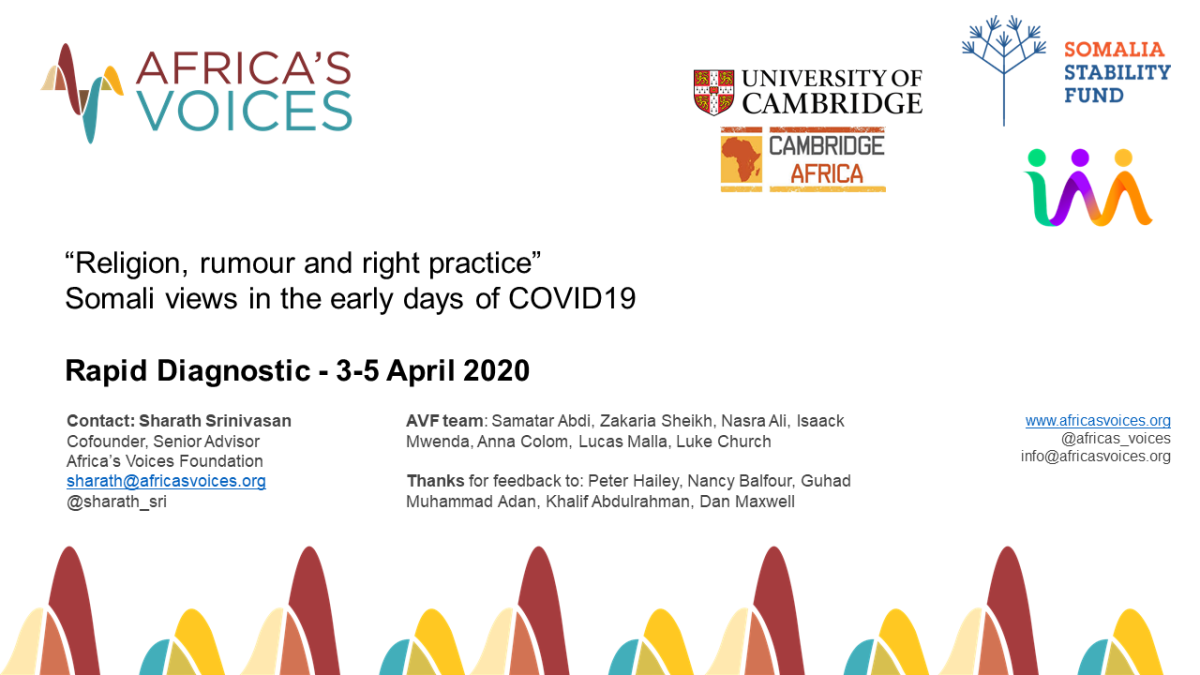Responding to COVID-19 in Somalia: interactive mass media, 1-to-1 messaging and rapid insights from citizen feedback

PIs: Dr Sharath Srinivasan, University of Cambridge, Dr George Gathigi, University of Nairobi and Samuel Kimeu, Africa’s Voices
A visual presentation of this work is availble here.
The Somalia Ministry of Health confirmed the first case of coronavirus (COVID-19) in Mogadishu on March 16, 2020. The COVID-19 crisis threatens Somalia in distinctive ways. Protracted armed conflict, coupled with recurring drought and humanitarian crisis, have resulted in enduring civilian suffering. In this context, rebuilding governance institutions has been vexed, and public infrastructure largely crippled. Instability, violence and fragility across the country, but especially in southern Somalia, as well as sporadically in the capital, Mogadishu, exacerbates the anxiety and fear caused by the global pandemic. The occasional outbreak of diseases such as measles and cholera, which spread easily in congested living conditions and where there is lack of clean water and sanitation, underline this vulnerability. The most vulnerable are the very large populations of internally displaced persons (IDPs) in urban and peri-urban settings, alongside the urban poor in all major towns and cities.
Prevention is the only option in Somalia, given the poor state of health capacity nationwide. Prevention requires mobillsing the right kind of collective and community action. Yet given the oral culture and the high illiteracy rates, the risk of spread of misinformation about the virus and aggravating public anxieties are alarmingly high. Here, risk communications and community engagement are vital, but face the challenge of socio-cultural and religious beliefs that may distort much needed objectivity on the nature of risk (e.g. beliefs among some that they are ‘immune’ because they believe in God). Social distancing measures will prove challenging in a highly communal society and in the absence of trusted authority and enforcement. Businesses and mosques are open as normal. Public transport and restaurants are operational. Social and behavioural change communication needs to be context relevant: free of jargon, empathetic, in local language and speech forms, and tailored to local socio-cultural identities and norm-change models.
The project is a collaboration between Cambridge and Africa-based researchers, led by Dr Sharath Sharath Srinivasan (Dept POLIS) and Luke Church (Computer Laboratory) and Dr George Gathigi (School of Journalism and Mass Communication, University of Nairobi, Kenya) working with the team at Africa’s Voices Foundation. It aims to conduct a rapid diagnostic on the community questions, concerns and risk perceptions in Somalia – especially peri-urban IDP settings – concerning COVID-19. The project is leveraging an existing trusted media and communications channel developed by Africa’s Voices for a gender equality and social inclusion programme, called ‘Imaqal’ (‘hear me’), which besides a large national radio listenership has an engaged followership of SMS texters of over 50,000. This followership is skewed towards urban/IDP/youth segments of the population, and has a strong representation of women, all of whom are key groups of concern with COVID19 in the Somali context. The diagnostic asked the existing cohort of 51,000 followers a question via SMS around their thoughts and questions on COVID19. We heard from nearly 8000 people (15%) on this question, on whom basic demographic questions (age, gender, location, IDP status) are held.[1]
The team has developed a coding frame and labelled the dataset to enable further testing and analysis and produce initial results. They are engaging with applied humanitarian researchers at the Centre for Humanitarian Change (CHC) and their Somalia based research network, to further explore and interpret the data and analysis. CHC and Africa’s Voices both have strong entry points to the humanitarian and health actors in Somalia, and to government officials, with whom to share insights. The WHO, UNICEF and UN-OCHA are already engaged.
*This project is supported by a Cambridge-Africa ALBORADA Research Fund COVID-19 Emergency Award.
________________________________________________________
[1] Africa’s Voices follows strict deidentification, data protection and data security processes, which we shall also follow. More information can be provided on request.

